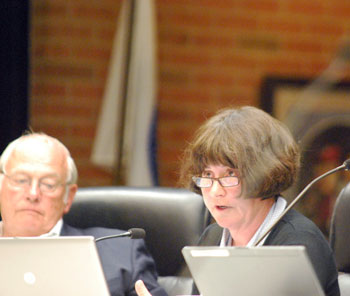Debate Details: Ann Arbor FY 2013 Budget
Ann Arbor city council meeting (May 21, 2012) Part 2: The council approved the city’s fiscal year 2013 budget – with disagreement about what priorities it reflected.

Tony Derezinski (Ward 2) looks on as Jane Lumm (Ward 2) pleads her case for increased police staffing levels. Though Derezinski had little sympathy for Lumm’s amendment on police officers, he joined her in supporting a budget amendment to restore collection of loose leaves in the fall as a city service. The city now collects leaves and compost in containers instead of allowing residents to sweep piles of leaves into the street. The amendment failed. (Photos by the writer.)
The cumulative impact of the amendments approved by the council on May 21 increased general fund expenditures to $79,070,842 against revenues of $79,193,112, for a surplus of $122,270. The entire city budget, across all funds, was proposed at $404,900,312 in revenues against $382,172,603 in expenses. The fiscal year begins on July 1.
Jane Lumm (Ward 2) saw two of her proposed amendments fail – which would have funded five additional police officers from non-specific reductions in other general fund departments, and would have restored the service of loose leaf collection in the fall. She also opposed the addition of a court secretary position for the 15th District Court, which the rest of her colleagues agreed to add into the budget that evening. That combination prompted her to vote against the overall budget, saying it did not adequately prioritize public safety. She was joined by Mike Anglin (Ward 5) in voting against the budget.
But Mayor John Hieftje summarized the majority view on the council in framing this year’s budget as a reflection of public safety as a top priority of the city – because nearly half of the general fund is being spent on public safety, and the vast bulk of additional revenue for FY 2013 (compared to the forecast in last year’s budget planning) is being spent on public safety. Those investments in public safety prevented further reduction in budgeted firefighters (by five) and in police officers (by nine) – reductions that were originally called for in the two-year budget plan. Those investments also allowed the city to add one police officer.
However, former police chief Barnett Jones and current fire chief Chuck Hubbard have identified ideal targets for staffing levels for their departments that are higher than the budgeted levels for FY 2013. For the fire department, that’s 82 firefighters compared to Hubbard’s ideal 88; for police, that’s 119 sworn officers compared to Jones’ ideal 150. The point of disagreement on the council essentially reduced to this: Should the city take additional steps this year to reduce the gap in public safety staffing between current levels and the ideal targets?
One resolution approved at the meeting – which did not actually modify the budget – simply directed the city administrator to bring a future mid-year budget amendment to add up to six firefighters to the budget – if a federal grant and increased state fire protection allocations materialize. Although it would have been conceivable to pass a parallel resolution on the police side of public safety, there was no effort at the table (by Lumm or other councilmembers) to modify Lumm’s resolution and stipulate that additional police officers would be hired, if a federal grant application were successful.
Voting for the budget were eight councilmembers, including Stephen Kunselman (Ward 3), who saw two of his own amendments fail. One would have interpreted the city ordinance on DDA TIF capture differently, which would have resulted in additional revenue to the city’s general fund – revenue sufficient to fund two firefighter positions. Also failing was an amendment that would have prevented the transfer of money to the public art fund from a variety of different sources. [The 8-2 overall budget vote on the 11-member council was due to the absence of Marcia Higgins (Ward 4) for the final vote. She attended the meeting and stayed for the better part of it, but succumbed to a persistent hacking cough before it ended.]
Although several amendments failed, others were approved by the council. Those included budget modifications that added a secretary position to the 15th District Court, increased human services funding by $46,899, added $78,000 to the Ann Arbor Housing Commission budget, and eliminated a contract with RecycleBank to administer a coupon program to encourage recycling.
The council’s budget discussion came in the context of a briefing from the city’s paid lobbyist in Lansing, Kirk Profit, who sketched an uncertain state budget picture, but offered compliments to the city’s approach to managing its budget.
Box-score style results on the budget amendments were previously covered in a report filed from the city council chambers on the night of the vote. Below we’ve summarized the deliberations by the council on the budget amendments. Items not related to the FY 2013 budget are detailed in Part 1 of this meeting report: “City Council Expands North Main Task Force.” [Full Story]




